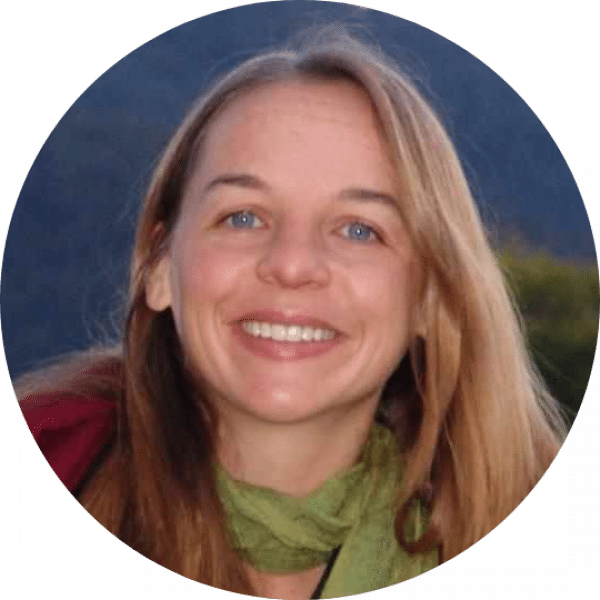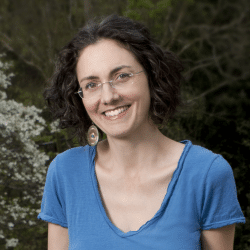Introduction
Amanda is building a curated system for social enterprises, responsible businesses, and conscious consumers to come together, support each other, and catalyze the transition to a 21st century economy that is good for people and good for the planet.
The New Idea
All around the world, people are becoming more aware that business as usual is not an option. By choosing to prioritize people and planet over short-term profits, they are helping to change the rules and create a new economic system. The true scale of this global economic movement is still not fully visible. Social and environmental labels and certification schemes can help consumers identify participants in this new economy, but they tend to be fragmented by sector and by region. They are also expensive and out of reach for many small-scale, localized initiatives. Amanda has developed a community-based curation system that is free, transparent, and works across economic sectors (from food, clothing, and travel to manufacturing, renewable energy, and financial services), scale (from startups and solopreneurs to volunteer networks and large, established companies), language barriers, and regional divides. Through this inclusive approach, Good Market increases the visibility of social enterprises and responsible businesses, opens opportunities for cross-sector collaboration, and helps catalyze the transition to an economic system that is good for people and good for the planet.
Purpose-driven enterprises may operate according to a different set of rules than profit-driven enterprises, but they fill the same functional niches in the economy. From energy to transport to finance, nearly every sector has enterprises that prioritize people and the planet. For consumers, Good Market is a trusted platform that makes it easier to choose everyday products and services. For vendors, Good Market makes it easier to find suppliers, service providers, partners, and investors that share their values and commitment to responsible practices. As vendors preferentially partner with one another, it drives co-evolution in different economic sectors and leads to new supply chains, networks, and advocacy groups.
Amanda says that Sri Lanka has been an extraordinary place to test the Good Market approach because of the small geographical area, strong social networks, local language translation requirements, and the ability to connect with enterprises across all scales and all sectors of the economy. The online platform is now being expanded beyond Sri Lanka through peer-to-peer vendor invites, outreach to local communities by university students, and community partners with their own networks of social enterprises and responsible businesses. The vision is a global platform that is self-financing and community owned.
The Problem
The economic system of the 20th century has prioritized short-term profits and returns to investors over long-term impact on our health, our communities, and our environment. This is not sustainable.
Just like ecosystems, economies are complex adaptive systems that can evolve and change over time in response to changing conditions. In this case, the changing condition is individual awareness. All around the world, people are becoming more aware of the social and environmental consequences of their choices. They are looking for products and services that are good for the environment, for community, and for health. Nielson in its Global Survey on Corporate Social Responsibility says that 55% of global online consumers say that they are willing to pay more for products and services provided by companies that are committed to positive social and environmental impact. This creates opportunities for enterprises that prioritize people and the planet.
The first challenge, however, is access to useful information. Even when people want to make choices that are aligned with their values and good for people and the planet, it can take considerable time and effort to identify and access these products and services. The amount of research required can be overwhelming, particularly for small businesses and families that are just struggling to get by. It is difficult to filter information and find relevant contacts. It is difficult to know where things really come from or how they were produced. It is difficult to know which information to trust. The proliferation of new sustainability labels and certification schemes has contributed to consumer confusion and doubt. To make things even more complicated, the lack of a sustainability label or certification doesn’t mean social and environmental standards aren’t met. Third-party labels cost money and don’t always make sense for companies that are small, focus on local markets, or operate in countries or regions where the certificate is unknown.
The second is that people feel small compared to the scale of modern social and environmental problems. New information and communication technology means we hear about conflict and crises in nearly every part of the world. Even individuals and organizations that are actively working for change can feel isolated and overwhelmed. It’s easy to become numb and question whether individual action really has an impact. Social enterprises and responsible businesses are starting to receive more media coverage and attention, but the initiatives with international recognition are only the tip of the iceberg. Many participants in the new economy are not easy to find online. Some are so busy doing the work that they don’t spend time telling their story. Some have limited access to internet. Some have language barriers. Terminology varies by country and by sector. This limits opportunities for exchange. The true scale of the movement is not easily visible.
We are at a critical juncture in human history. Individuals and organizations around the world are beginning to work according to a different set of rules, but it is still not clear whether we, as a species, will make the necessary shift in time. There is an urgent need to increase the visibility of the emerging new economy movement, make it easier for people to get involved, help participants find and connect with one another, and actively catalyze the transition to a 21st century economy that prioritizes people and the planet.
The Strategy
Good Market is the first consolidated and curated community of social enterprises and responsible businesses that cuts across economic sectors, scale, language barriers and regional divides. This makes it easier for participants in the new economy to find, connect, and exchange with one another.
The Good Market community platform specializes in curation and connection. In order to become a Good Market approved vendor, applicants complete a dynamic online form that covers 6 categories of operations: organization, customers, workers, suppliers, community, and environment. The curation process is based on minimum sector standards, which were developed by aggregating industry best practices and translating them into everyday language. The minimum standards are updated and improved based on community feedback. Applicants that do not meet minimum sector standards are encouraged to connect with other vendors, make improvements, and reapply. Vendor claims are public and transparent. If customers, workers, suppliers, or community members have evidence of a false claim, they can flag a vendor profile, which starts a review process. If it is found that an organization made a false claim, they lose their standing as a Good Market vendor. This crowdsourced monitoring system not only reduces costs, it also builds trust and increases community ownership. Since the curation process is free and works across sectors, languages, and geographical divides, it is possible to include small-scale, locally oriented enterprises and groups that cannot afford third-party certification. This increases their credibility and visibility and shows the true scale of the new economy movement.
Once an applicant is approved as a Good Market vendor, they get a multilingual vendor page on the global online platform. The basic vendor page includes contact details, photos, all of the claims from their application form, and their vendor level, which ranges from 1 to 5. The vendor level is automatically generated based on how vendors answer questions in the application form. Vendors at Level 1 meet Good Market minimum standards. Vendors at higher levels have demonstrated a stronger focus on people and planet. The levels are visible in the search results, which provides vendors with an additional incentive to adopt new practices that benefit people and the planet. One way that vendors can raise their level is by partnering with other Good Market vendors as suppliers and customers. Good Market rewards collaboration because it drives co-evolution and strengthens the overall ecosystem. Vendors that want to do more on the site can upgrade to active status for a monthly subscription of 10 US dollars. Active vendors are able to post Offers (products, services, events, etc.) and Needs (partners, financial investment, job vacancies, volunteer requirements, etc.) on the site.
At the end of 2017, Good Market had more than 500 social enterprises and responsible businesses on the platform. The vendors partner with each other as both suppliers and customers. For example, Kantala makes notebooks out of traditionally woven hana fiber, handloom fabric from Selyn Fair Trade, and elephant dung paper from Eco Maximus. ApiHappi produces bean bags from discarded rice bags from Rice & Carry and from natural plant dyed fabric from AMMA and promotes the bean bags through Cafe Kumbuk, another Good Market approved vendor. Vendors that have developed their own cafes, retail outlets, and online stores preferentially source from other Good Market approved vendors. Vendors also partner to raise public awareness or influence government policy. For example, Good Market community members focused on ethical fashion work together on “Fashion Revolution” campaigns. There are also groups working on organic agriculture policy, social enterprise legislation, and zero waste campaigns.
Good Market community members are visitors to the site that actively participate in the new economy by making daily decisions that prioritize people and the planet. This includes choosing products and services from organizations that share their values, volunteering and supporting groups that are working for change, and sharing information and raising awareness that another way is possible. On the platform, they can invite friends and earn points, leave feedback, monitor and flag vendors, ask and answer questions, participate in community conversations, and apply to become a vendor. Many current Good Market vendors started as community members and customers. The community section of the site has been a valuable resource for many applicants and vendors. For example, when one applicant was not approved for their handmade greeting cards, they reached out to the community for more information on where to source environmentally responsible paper. They changed their materials, refined their mission, reapplied, and became a proud member of the Good Market vendor community.
Based on requests from the vendors, Good Market will be releasing the next phase of the online platform in early 2018 with faceted consumer-grade search, chat functionality, and online payments. These improvements will make it easier for Good Market community members to find, connect, and exchange with one another. A small percentage-based transaction fee will be added for online payments to help ensure the financial sustainability of the site.
Although the platform is still officially being beta tested in Sri Lanka, there are already Good Market approved vendors in more than 10 countries. This is primarily due to current community members inviting friends, suppliers, and customers in other parts of the world. Once the next phase of the platform is released, the focus will shift to scaling beyond Sri Lanka. The site is currently available in English, Sinhala, and Tamil. Urdu translation is complete, and Thai, Bangla, Japanese, Chinese, Turkish, Arabic, Russian, French, German, Dutch, and Spanish speaking community members have offered to translate the platform into their mother languages.
The main scaling strategies draw on existing social networks in the new economy movement. The first is invites. Community members earn points for inviting other participants in the new economy to join the platform, and they are able to use these points to boost their profile, offers, and needs to the top of the page. Second, is outreach through community partners. These are vendors with their own networks in a particular sector or geographical area. Community partners are able to use the Good Market platform as a tool to highlight their network under their own name and logo. They can also earn a revenue share from their members’ transactions on the site. Good Market is already starting to test this approach with membership organizations, marketplaces, retail outlets, incubators, sustainability consultants, and international certification bodies. The third strategy is working with university professors and student groups focused on social enterprise, fair trade, and sustainable development to identify potential vendors in the surrounding area and help them join the platform. Working with community partners and university students will support localization and ensure that rural and disadvantaged groups continue to be included on the platform.
Through Good Market, Amanda is making it easier for the participants in this movement to come together, support each other, and catalyze the transition to the new economy. From the beginning Good Market has operated as a self-financing, not-for-profit social enterprise. It started without any external funding or sponsorship. It has a core team that holds the space but there are no owners or dividends. Surplus is reinvested to expand Good Market services. The community platform will be developed according to the same model. The goal is an inclusive global platform that is mission-driven, community-governed, and financially sustainable.
The Person
Amanda grew up in northern Michigan, an agricultural area of the United States, with cherry farming on one side of the family and Christmas tree farming on the other. When she was 9 years old, she was diagnosed with scoliosis, a curvature of the spine. Despite wearing a corrective back brace for years, the curve continued to progress. Local doctors said the situation was life threatening and referred the family to a hospital 5 hours away, where Amanda eventually had spinal fusion surgery. During this same period, Amanda’s parents divorced and her mother returned to university. As the eldest, Amanda took on more responsibility at home.
In the area Amanda grew up, travel, particularly international travel, was seen as something only accessible to wealthy people. Being an avid reader and curious to see the world, Amanda began raising money at 14. She worked on the family farm, made and sold jewelry, babysat, mowed lawns, and solicited donations from local businesses, until, at 16, she had enough money to participate in an international exchange program. This experience changed her relationship with money, views on travel, and understanding of the world.
In college, Amanda studied ecology and environmental toxicology, which sparked a fascination with complex adaptive systems. After moving to Asia in 1999, she began focusing more on how change happens in social systems. She worked with mission-driven local organizations on community organizing, network building, and institutional change and was particularly influenced by her experiences with Sevalanka during the tsunami and Sri Lankan civil war. Working with these organizations, pushed her to take a deeper look at how economic systems are embedded in social and ecological systems and how economic factors influence social and environmental change, which led to the development of the Good Market approach.
Good Market started in 2012 with a volunteer-driven weekly event, which rapidly grew in size and spread to additional days and venues. A retail outlet opened in 2014. Around 2015, Good Market started to get applications from international groups and service providers that did not want to participate in the event or the retail outlet. They were applying because they wanted to be part of the Good Market community, and they wanted to be recognized as Good Market approved vendors. Good Market also started to get new types of inquiries from Sri Lanka and abroad. Individuals would ask “How can I get solar power for my home?” or “Are there any organic farms I can visit?” Businesses would contact looking for suppliers, service providers, or new market channels. These changes and discussions with friends working on similar issues in other countries led to the development of the Good Market online community platform. The application form went live in August 2016 and the public beta version of www.goodmarket.global began rolling out in 2017.




